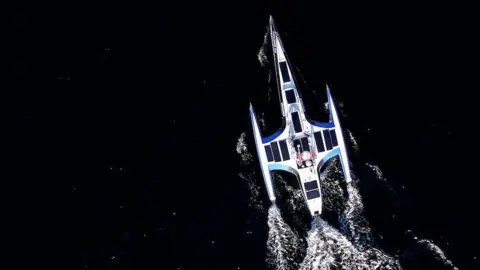AI-driven robot boat Mayflower crosses Atlantic Ocean
 Oliver Dickinson for IBM/ProMare
Oliver Dickinson for IBM/ProMareA crewless ship designed to recreate the Mayflower's historic journey across the Atlantic 400 years ago has crossed the ocean, project bosses have said.
The Mayflower Autonomous Ship (MAS) completed a 2,700-mile (4,400km) trip from Plymouth in the UK to Halifax in Nova Scotia, Canada, on Sunday.
It had been due to go to Massachusetts in the USA, but was diverted to Canada to investigate issues it had at sea.
The craft was likely to stay in Halifax for a week or two, managers said.
The 50ft (15m) long solar-powered trimaran is capable of speeds of up to 10 knots (20km/h) and was navigated by on-board artificial intelligence (AI) created by IBM with information from six cameras and 50 sensors.
It was created to show the development of technology in the centuries since the Pilgrim Fathers set sail for the New World, bosses said.
 IBM
IBMIt set off from the UK on 29 April and had been expected to take about three weeks to make the journey.
However, it suffered some technical difficulties before the decision was made at the end of May to divert to Halifax.
Project director Brett Phaneuf said the IBM technology "remained functioning as intended" and it was still planned for the boat to sail on to Plymouth, Massachusetts, and then on to Washington DC.
He said: "The journey she made across was arduous and has taught us a great deal about designing, building and operating a ship of this nature and the future of the maritime enterprise."
The original Mayflower, a 100ft (30m) triple-masted wooden vessel with canvas sails and a top speed of three knots (6km/h), carried 102 passengers and a crew of about 30 from Plymouth to Cape Cod, Massachusetts.
The crossing in 1620 took more than two months.

Follow BBC News South West on Twitter, Facebook and Instagram. Send your story ideas to [email protected].
